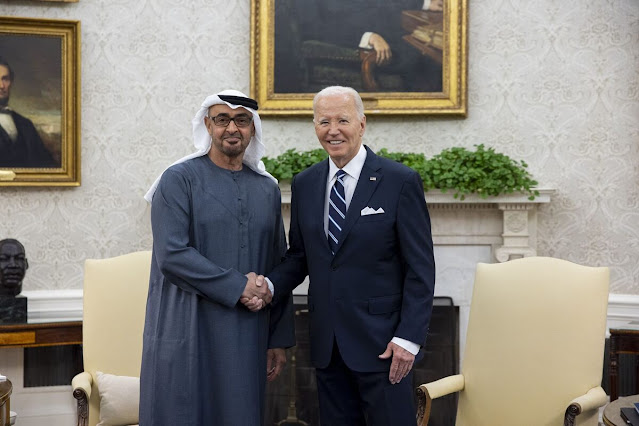United States and United Arab Emirates Cooperation on Artificial Intelligence
A Strategic Partnership for the Future
In an era where artificial intelligence (AI) is poised to revolutionize economies and societies, the partnership between the United States and the United Arab Emirates (UAE) stands out as a significant collaboration. This strategic alliance aims not only to enhance technological innovation but also to address critical issues such as cybersecurity, ethical AI development, and sustainable practices. The recent framework established by both nations underscores their commitment to fostering a safe and trustworthy AI landscape.
The cooperation was solidified during a meeting between U.S. President Joe Biden and UAE President Sheikh Mohamed bin Zayed Al Nahyan, where they endorsed the "Common Principles for Cooperation on AI." This agreement outlines key areas of collaboration, including regulatory alignment, talent development, and the promotion of clean energy solutions for AI infrastructures. The initiative reflects a shared vision of leveraging AI for economic growth while ensuring ethical standards are maintained.
Economic Implications of AI Cooperation
The economic landscape is set to transform significantly through this partnership. The UAE has been rapidly transitioning from an oil-dependent economy to one that embraces technology and innovation. In 2023, non-oil trade between the UAE and the U.S. reached approximately $31.4 billion, highlighting the growing economic ties between the two nations. The integration of AI into various sectors is expected to further bolster this relationship, creating new job opportunities and enhancing productivity across industries.
Moreover, the UAE's ambition to become a global hub for advanced technologies has led to collaborations with leading American tech companies such as Microsoft and OpenAI. These partnerships aim to develop cutting-edge AI applications that can be deployed not only within the UAE but also across regions like Africa and Central Asia. For instance, Microsoft's $1.5 billion investment in G42, a prominent UAE-based AI firm, exemplifies this commitment to joint technological advancement.
Addressing Challenges in AI Development
While the potential benefits of AI are vast, both countries acknowledge the accompanying risks and challenges. The framework emphasizes the importance of developing safeguards to protect national security interests and ensure that AI technologies are used responsibly. This includes addressing issues related to bias in algorithms and ensuring fairness in AI applications.
The U.S.-UAE partnership also aims to promote ethical research in AI, focusing on transparency and accountability in technology deployment. By fostering an environment that prioritizes ethical considerations, both nations seek to build public trust in AI technologies while encouraging innovation.
A Vision for Sustainable Development
Sustainability is another cornerstone of this partnership. The leaders have committed to promoting clean energy solutions that support AI infrastructure development. As highlighted in their discussions, integrating renewable energy sources into AI operations is crucial for minimizing environmental impact while maximizing technological benefits.
This initiative aligns with broader global efforts to combat climate change and advance sustainable practices. By leveraging their respective strengths—UAE's investments in clean energy and U.S.'s technological expertise—the two nations are setting a precedent for how international partnerships can effectively address global challenges.
A Forward-Looking Alliance
The cooperation between the United States and the UAE on artificial intelligence represents a forward-looking alliance that seeks to harness technology for economic growth while addressing ethical and sustainability concerns. As both countries work towards implementing the principles outlined in their recent agreement, they are not only enhancing their bilateral relationship but also positioning themselves as leaders in the global AI landscape.
This partnership serves as a model for future collaborations between nations aiming to navigate the complexities of emerging technologies while fostering mutual economic prosperity and social responsibility. As the world watches this dynamic relationship unfold, it will be crucial to monitor how these initiatives translate into tangible benefits for both nations and beyond.



Comments
Post a Comment